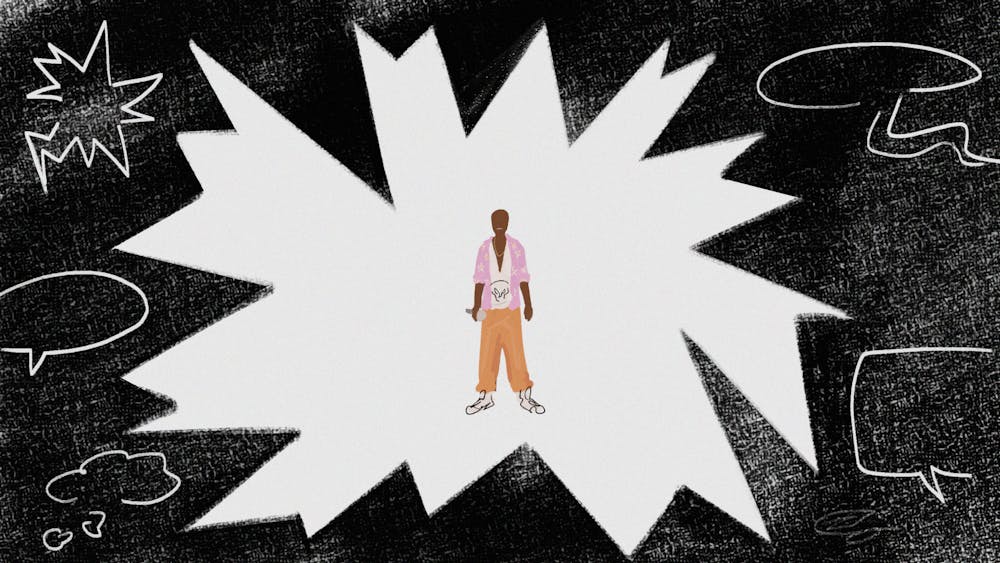Recently, celebrities have been more empowered than ever to open up about their struggles with mental health. Musicians and actors alike, from Demi Lovato and Lizzo to Bo Burnham and Lady Gaga, have come forward and tell their stories. While openness is always welcome, there are still more steps needed to ensure that artists can feel safe and comfortable with themselves. An incident that confirms this thought is Kid Cudi’s viral departure at Rolling Loud Miami.
When the festival announced its 2022 lineup, hip–hop fans everywhere celebrated the live return of Kanye West, an iconic and increasingly controversial figure. Initially, the lineup on Friday, July 22, included a headlining show by the Chicago rapper, who was entrenched in the chaotic rollout of his upcoming album, Donda 2. However, West abruptly left the festival days before it began, leading to the festival replacing his set with Kid Cudi, a fellow rapper who’s had a lot of history with West, whether that means collaborative albums or public arguments.
What followed in Miami was an outstanding fallout that shines a light on how artists’ mental health can be affected by how fans choose to interpret their interpersonal relationships and problems that stem from them.
Cudi arrived and performed a few songs in Hard Rock Stadium, but crowd problems quickly surfaced. During his performance of “REVOFEV,” his fourth song on stage, a member of the audience threw a plastic water bottle at his face. After addressing the moment and claiming he would leave if another thing was thrown, a second water bottle met the the stage. Cudi left the stage in a matter of minutes.
Despite West’s removal from the festival lineup, he joined the stage with Lil Durk around the same time that night, soundtracking his introduction with “Father Stretch My Hands Pt. 1,” a song that notably features Cudi.
The anger from members of the crowd and West’s bizarre appearance on a different set was no surprise, considering the growing drama between the two rap prodigies. The tension began last February when West suddenly posted on Instagram that Cudi wouldn’t collaborate on his latest work because of his friendship with comedian Pete Davidson, who was dating West’s ex–wife, Kim Kardashian, at the time. Davidson and Kardashian separated six months later, rendering the rap drama unnecessary. The controversial announcement was like much of the content on West’s Instagram. The star was temporarily banned from the platform, as he frequently posted and deleted aggressive statements targeting Davidson and Kardashian.
These personal disagreements, brought into the media circus, led to unruly West fans and Cudi’s Rolling Loud set ending earlier than expected. The fact that private matters can enter the media and become a point of contention for artists and fans can cause problems.
A recent example is Harry Styles, who condemned social media after several toxic fans attacked his girlfriend, Olivia Wilde, on Twitter. Should artists have to worry about the public’s reaction to their personal lives, especially when they involve fellow celebrities? Why should Cudi have to deal with angry fans when he had nothing to do with provoking them?
Many hip–hop fans are already aware of Cudi’s mental health struggles, which amplifies the problem of his being harassed in Miami. The rapper famously went to rehab in 2016, where he also claimed he had a stroke that incapacitated him for months. Since then, he’s been open about his experience with depression, simultaneously garnering support among fans.
The Rolling Loud debacle and Cudi’s response to violent audience members represent a bigger picture of mental health among celebrities, especially men of color. When these famous people have to deal with drama, aggressive crowds, racism, and anything in between, they struggle in the public eye.
Similarly, the controversy surrounding Idris Elba as James Bond upset the actor, whom critics deemed unfit for the role because he isn’t white. Additionally, Kanye West’s discussions and lyrics about his experiences with bipolar disorder have helped bring mental health into focus in the hip–hop industry for the past few years, even in spite of his questionable and abrasive career choices.
These moments can be important for men of color, who often struggle to identify mental problems and open up to the world about their problems, among patriarchal and white supremacist views of power and influence in the United States.
There are still many steps needed in order to ensure that artists and celebrities can better manage their mental health. Recent studies have found that actors and musicians suffer from more depression and anxiety than the general public.
Also, many of them are subject to parasocial relationships and are seen as somehow greater or more important than the average person, with some even having to deal with stalkers. Each famous person who comes forward with their story and opens up can move the discussion forward and hopefully help fans understand the impact of drama or anything else that may cause a struggle.
Fanbases can also encourage each other to stop holding their favorite musicians and actors to such high standards and try to breed positivity among those circles. Celebrities can address it, too, as Harry Styles did over his relationship. But why should “The World’s Most Wanted Man” have to protect his significant other from his own fanbase?
As long as people, famous or otherwise, can hold their communities accountable for how artists should be treated and perceived, the drastic celebrity struggles can be alleviated for the better of everyone who makes or consumes their art.
With the right attitudes and approaches toward helping celebrities and understanding their positions despite their obvious material wealth, concerts can be covered with an atmosphere of fun and excitement instead of thrown water bottles.







